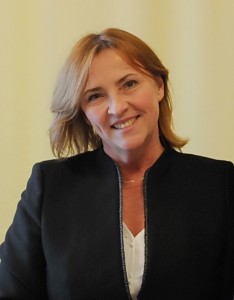ASTANA – With Latvia taking over the Presidency of the EU Council in first half of 2015, Central Asia will become a priority, said Chair of the European Parliament Delegation on cooperation with Kazakhstan and other Central Asian countries Iveta Grigule in a Jan. 22 interview with The Astana Times in Astana.
 “One of the top priorities of Latvia is Central Asian issues. We want more attention, more contacts, more cooperation and the development of mutually beneficial areas, as well as elaboration of the new EU strategy for Kazakhstan and Central Asian countries. Let me note that this can be done effectively only by considering each country in Central Asia separately and individually,” said Grigule, who was in the Kazakh capital from Jan. 21-23.
“One of the top priorities of Latvia is Central Asian issues. We want more attention, more contacts, more cooperation and the development of mutually beneficial areas, as well as elaboration of the new EU strategy for Kazakhstan and Central Asian countries. Let me note that this can be done effectively only by considering each country in Central Asia separately and individually,” said Grigule, who was in the Kazakh capital from Jan. 21-23.
In 2007, Grigule noted, the EU devised a strategy for Central Asia – but didn’t distinguish much between the individual nations of the region. “Officials in Europe now realise that these countries have completely different economic and social development, priorities and ways of implementation,” she said.
This realisation must lead to new, more specific strategies for dealing with the different nations of the region, Grigule said, a process which Kazakhstan is already part of. “Kazakhstan has already made a contribution to the process of elaboration of the new strategy. The EU Council received from Kazakh diplomats a letter that was prepared by the Ministry of Foreign Affairs of Kazakhstan jointly with other state bodies, which offers suggestions concerning new ways of cooperation that will lead to mutually beneficial results,” she said.
“[D]uring the Latvian presidency of the EU Council, new conceptual documents are being generated for the coming four to six years. The new strategy is our priority. Of course, it would be great if we could complete our mission; to at least bring it to the point at which everything is done and only technicalities are left,” she said. “Therefore, we will use as much as possible of our resources, time and ideas in order to do the bulk of the work.”
Kazakhstan and the EU have now finalised a new Enhanced Partnership and Cooperation Agreement, the development of which has taken several years. The signing of the new agreement, initialed in Brussels on Jan. 20, is expected to take place at the end of the summer, the EU Parliamentary delegate said, with ratification by national parliaments to follow. Ratification by each of the EU’s 28 national parliaments should be expected to take some time, she said.
“Concerning the Latvian Parliament, I have no doubts that the decision will be made quickly. I think the parliaments of Lithuania and Estonia, our closest neighbours, will also make the decision quickly. I hope the other countrieswill not delay, because in the EU we understand that this agreement is a big success and a big step onward in the relations of the EU and Kazakhstan,” she added.
Kazakhstan’s foreign policy is “very balanced,” Grigule said. Kazakhstan “is realising the policy of multi-vector diplomacy very correctly, constructively and pragmatically,” she said. “The EU is proud that it is the biggest trade partner of Kazakhstan, and we have room to grow.”
While in Astana, the EU parliamentary delegate met with Human Rights Ombudsman of Kazakhstan Askar Shakirov, head of the Committee for Human Rights of Kazakhstan’s Parliament Kuanysh Sultanov and Minister of Foreign Affairs Erlan Idrissov, as well as with representatives of nongovernmental organisations.
“The purpose of the [EU Parliament] delegations is to strengthen contacts and relations between people,” Grigule said. The delegation to six Central Asian countries consists of 19 members of the European Parliament from different countries.
Kazakh-Latvian relations, Grigule said, have always been excellent and based on mutual understanding and respect. “Both of our countries have things to offer to each other. There are priority areas such as transit and transport, agriculture, technologies, medicine.” There are also opportunities for cooperation in culture, communications and student exchange programmes, she said.
This trip is Grigule’s second visit to Astana – she came in April 2011 to observe that year’s presidential election. “When I first came to Astana, I was very surprised by the city: the very good infrastructure, wide, smooth roads and modern architecture impressed me a lot. People of both of our countries remember how we lived 25-30 years ago, in the Soviet period. The progress that Kazakhstan has made in its economy and development of the country is very significant and remarkable. It is a good example for everyone.”
